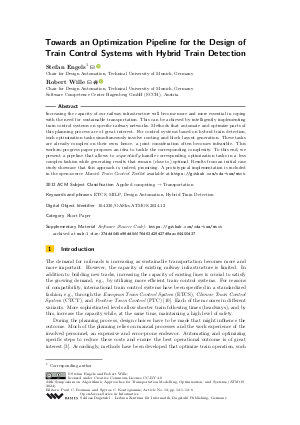Towards an Optimization Pipeline for the Design of Train Control Systems with Hybrid Train Detection (Short Paper)
Authors
Stefan Engels  ,
Robert Wille
,
Robert Wille 
-
Part of:
Volume:
24th Symposium on Algorithmic Approaches for Transportation Modelling, Optimization, and Systems (ATMOS 2024)
Part of: Series: Open Access Series in Informatics (OASIcs)
Part of: Conference: Symposium on Algorithmic Approaches for Transportation Modelling, Optimization, and Systems (ATMOS) - License:
 Creative Commons Attribution 4.0 International license
Creative Commons Attribution 4.0 International license
- Publication Date: 2024-10-07
File

PDF
OASIcs.ATMOS.2024.12.pdf
- Filesize: 1.17 MB
- 6 pages
Document Identifiers
Subject Classification
ACM Subject Classification
- Applied computing → Transportation
Keywords
- ETCS
- MILP
- Design Automation
- Hybrid Train Detection
Metrics
- Access Statistics
-
Total Accesses (updated on a weekly basis)
0PDF Downloads0Metadata Views
Abstract
Increasing the capacity of our railway infrastructure will become more and more essential in coping with the need for sustainable transportation. This can be achieved by intelligently implementing train control systems on specific railway networks. Methods that automate and optimize parts of this planning process are of great interest. For control systems based on hybrid train detection, such optimization tasks simultaneously involve routing and block layout generation. These tasks are already complex on their own; hence, a joint consideration often becomes infeasible. This work-in-progress paper proposes an idea to tackle the corresponding complexity. To this end, we present a pipeline that allows to sequentially handle corresponding optimization tasks in a less complex fashion while generating results that remain (close to) optimal. Results from an initial case study showcase that this approach is, indeed, promising. A prototypical implementation is included in the open-source Munich Train Control Toolkit available at https://github.com/cda-tum/mtct.
Cite As Get BibTex
Stefan Engels and Robert Wille. Towards an Optimization Pipeline for the Design of Train Control Systems with Hybrid Train Detection (Short Paper). In 24th Symposium on Algorithmic Approaches for Transportation Modelling, Optimization, and Systems (ATMOS 2024). Open Access Series in Informatics (OASIcs), Volume 123, pp. 12:1-12:6, Schloss Dagstuhl – Leibniz-Zentrum für Informatik (2024)
https://doi.org/10.4230/OASIcs.ATMOS.2024.12
BibTex
@InProceedings{engels_et_al:OASIcs.ATMOS.2024.12,
author = {Engels, Stefan and Wille, Robert},
title = {{Towards an Optimization Pipeline for the Design of Train Control Systems with Hybrid Train Detection}},
booktitle = {24th Symposium on Algorithmic Approaches for Transportation Modelling, Optimization, and Systems (ATMOS 2024)},
pages = {12:1--12:6},
series = {Open Access Series in Informatics (OASIcs)},
ISBN = {978-3-95977-350-8},
ISSN = {2190-6807},
year = {2024},
volume = {123},
editor = {Bouman, Paul C. and Kontogiannis, Spyros C.},
publisher = {Schloss Dagstuhl -- Leibniz-Zentrum f{\"u}r Informatik},
address = {Dagstuhl, Germany},
URL = {https://drops.dagstuhl.de/entities/document/10.4230/OASIcs.ATMOS.2024.12},
URN = {urn:nbn:de:0030-drops-212002},
doi = {10.4230/OASIcs.ATMOS.2024.12},
annote = {Keywords: ETCS, MILP, Design Automation, Hybrid Train Detection}
}
Author Details
Supplementary Materials
-
Software (Source Code)
https://github.com/cda-tum/mtct
browse
 archived version
archived version
References
- Maarten Bartholomeus, Laura Arenas, Roman Treydel, Francois Hausmann, Nobert Geduhn, and Antoine Bossy. ERTMS Hybrid Level 3. SIGNAL + DRAHT (110) 1+2, 2018. URL: https://www.eurailpress.de/fileadmin/user_upload/SD_1_2-2018_Bartholomaeus_ua.pdf.
- Ralf Borndörfer, Torsten Klug, Leonardo Lamorgese, Carlo Mannino, Markus Reuther, and Thomas Schlechte, editors. Handbook of Optimization in the Railway Industry. Springer, 2018. URL: https://doi.org/10.1007/978-3-319-72153-8.
- Stefan Dillmann and Reiner Hähnle. Automated planning of ETCS tracks. In Reliability, Safety, and Security of Railway Systems. Modelling, Analysis, Verification, and Certification. Springer, 2019. URL: https://doi.org/10.1007/978-3-030-18744-6_5.
- Stefan Engels, Tom Peham, Judith Przigoda, Nils Przigoda, and Robert Wille. Design tasks and their complexity for the European Train Control System with hybrid train detection. CoRR, 2024. URL: https://arxiv.org/abs/2308.02572.
- Stefan Engels, Tom Peham, and Robert Wille. A symbolic design method for ETCS Hybrid Level 3 at different degrees of accuracy. In 23rd Symposium on Algorithmic Approaches for Transportation Modelling, Optimization, and Systems (ATMOS), 2023. URL: https://doi.org/10.4230/OASICS.ATMOS.2023.6.
- Stefan Engels and Robert Wille. Comparing lazy constraint selection strategies in train routing with moving block control. CoRR, 2024. URL: https://arxiv.org/abs/2405.18977.
- D.C. Gill and C.J. Goodman. Computer-based optimisation techniques for mass transit railway signalling design. IEE Proceedings B Electric Power Applications, 139(3), 1992. URL: https://doi.org/10.1049/ip-b.1992.0031.
- Gurobi Optimization, LLC. Gurobi Optimizer Reference Manual, 2023. URL: https://www.gurobi.com.
- Torsten Klug, Markus Reuther, and Thomas Schlechte. Does laziness pay off? - a lazy-constraint approach to timetabling. In 22nd Symposium on Algorithmic Approaches for Transportation Modelling, Optimization, and Systems (ATMOS), 2022. URL: https://doi.org/10.4230/OASIcs.ATMOS.2022.11.
- Jörn Pachl. Railway Signalling Principles: Edition 2.0. TU Braunschweig, 2021. URL: https://doi.org/10.24355/dbbs.084-202110181429-0.
- Tom Peham, Judith Przigoda, Nils Przigoda, and Robert Wille. Optimal railway routing using virtual subsections. In Reliability, Safety, and Security of Railway Systems. Modelling, Analysis, Verification, and Certification. Springer, 2022. URL: https://doi.org/10.1007/978-3-031-05814-1_5.
- Thomas Schlechte, Ralf Borndörfer, Jonas Denißen, Simon Heller, Torsten Klug, Michael Küpper, Niels Lindner, Markus Reuther, Andreas Söhlke, and William Steadman. Timetable optimization for a moving block system. Journal of Rail Transport Planning & Management, 22, 2022. URL: https://doi.org/10.1016/j.jrtpm.2022.100315.
- Valeria Vignali, Federico Cuppi, Claudio Lantieri, Nicola Dimola, Tomaso Galasso, and Luca Rapagnà. A methodology for the design of sections block length on ETCS L2 railway networks. Journal of Rail Transport Planning & Management, 13, 2020. URL: https://doi.org/10.1016/j.jrtpm.2019.100160.
- Robert Wille, Tom Peham, Judith Przigoda, and Nils Przigoda. Towards automatic design and verification for Level 3 of the European Train Control System. In Design, Automation & Test in Europe Conference & Exhibition (DATE), 2021. URL: https://doi.org/10.23919/date51398.2021.9473935.
